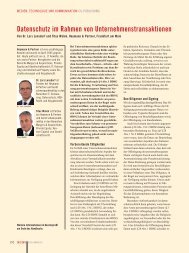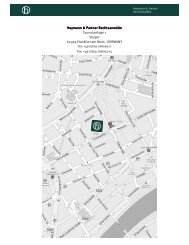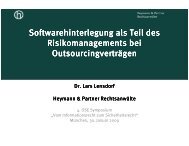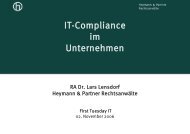e-commerce LAW & STRATEGY - Heymann & Partner, Rechtsanwälte
e-commerce LAW & STRATEGY - Heymann & Partner, Rechtsanwälte
e-commerce LAW & STRATEGY - Heymann & Partner, Rechtsanwälte
You also want an ePaper? Increase the reach of your titles
YUMPU automatically turns print PDFs into web optimized ePapers that Google loves.
Used Licenses<br />
continued from page 2<br />
copyright law is whether the distinction<br />
between physical incorporations<br />
and rights can still be upheld, and<br />
whether such a decision is justified in<br />
light of technical progress and the<br />
economic interests of consumers and<br />
businesses. In its thoroughly reasoned<br />
decision this year, the Munich<br />
Court of First Instance deals with<br />
these arguments in detail and says<br />
that the right-holders’ interests, for<br />
several reasons, can be properly protected<br />
only if physical works are<br />
treated differently from how license<br />
rights are treated, with one of these<br />
reasons being not only legitimate<br />
financial interests, but also necessary<br />
protection from pirated copies.<br />
Again, the judgment of the Munich<br />
Court of First Instance has been<br />
appealed, and once more it is up to<br />
the Oberlandesgericht to re-evaluate<br />
its earlier findings. It would be more<br />
than a surprise, however, if the<br />
Appellate Court deviates from its first<br />
decision and then — economic interests<br />
apparently being strong on both<br />
sides — the case certainly will go to<br />
the Federal Court and be decided<br />
soon, particularly as in Germany’s<br />
northern territories, courts have<br />
shown a partly different view.<br />
HAMBURG COURT DECISIONS<br />
ON AD FOR USED LICENSES<br />
While the Munich decisions rendered<br />
support to the software manufacturers’<br />
position regarding transfer<br />
of software licenses, they suffered<br />
a setback in Hamburg. The First<br />
Instance Court in Hamburg<br />
(Landgericht Hamburg, June 29, 2006,<br />
Mobile Marketing<br />
continued from page 1<br />
IS IT E-MAIL OR A CALL?<br />
Two different regulatory structures<br />
apply to mobile-marketing campaigns,<br />
depending on whether the<br />
campaign emphasizes phone or email<br />
messages. If your marketing message’s<br />
destination is an e-mail address<br />
— the traditional @ with a domain<br />
name — then treat it as an e-mail; but<br />
if a telephone number is the destination,<br />
then consider it a phone call.<br />
6<br />
File Number 315 O 343/06) had to<br />
decide on a case that a software dealer<br />
for Microsoft products brought<br />
against usedSoft (same defendant as<br />
in the Munich case). The plaintiff<br />
apparently felt pressured economically<br />
by usedSoft’s aggressive advertisement<br />
for the business model of used<br />
licenses, and filed for a preliminary<br />
injunction to prohibit this advertisement,<br />
which allegedly promoted a<br />
prohibited business. Microsoft was<br />
not a party to the case.<br />
In light of the Munich decisions, the<br />
Hamburg Court of First Instance surprisingly<br />
rejected the application and<br />
held that the business model of resale<br />
of “used” licenses does not infringe<br />
provisions of the copyright act. The<br />
Hamburg court applied the exhaustion<br />
principle and found that the resale of<br />
such licenses could not be restricted<br />
and does not require Microsoft’s consent.<br />
Advertisement for this business<br />
model, then, was not considered to be<br />
promoting illegal activity.<br />
The decision was confirmed by the<br />
Appellate Court (Hanseatisches<br />
Oberlandesgericht, Feb. 2, 2007, File<br />
Number 5 U 140/06), but the Court<br />
moved away from the application of<br />
the exhaustion principle and<br />
declared (probably in an attempt to<br />
avoid open collision with the Munich<br />
Court of Appeals) that the case needed<br />
only application of the provisions<br />
of fair advertisement in the law on<br />
unfair competition. Considering<br />
these provisions, advertisement for a<br />
business model could not be objected<br />
to if it fairly mentioned the legal<br />
dispute so that customers knew the<br />
potential risks. This declaration is in<br />
principle fully in line with the gener-<br />
If it’s an e-mail, then your campaign<br />
will be governed by the Controlling the<br />
Assault of Non-Solicited Porno- graphy<br />
and Marketing Act, (“CAN-SPAM”) (15<br />
U.S.C. §7701-7713) and the Federal<br />
Communications Commission’s Wireless<br />
E-mail Rule (64 C.F.R. §64.3100).<br />
If it’s a telephone call, then it will<br />
be governed by the Telemarketing<br />
and Consumer Fraud and Abuse<br />
Prevention Act (“TCFAP”) (15 U.S.C.<br />
§6101-6108), the Telephone Consumer<br />
Protection Act (“TCPA”) (47 U.S.C.<br />
§227) and, of course, the Tele-<br />
e-Commerce Law & Strategy ❖ www.ljnonline.com/alm?ecomm<br />
al requirements of advertisement<br />
law, but it is highly doubtful whether<br />
usedSoft has really mentioned the<br />
legal disputes (at all) and in a way<br />
that informs customers about the critical<br />
issue — whether purchasing<br />
such licenses means obtaining anything<br />
at all. If the Munich decisions<br />
should be upheld, all such “used”<br />
license transactions are void, if the<br />
consent of the rightholders cannot be<br />
established. In such a case, customers<br />
would be left with a compensation<br />
claim against usedSoft but<br />
could be subject to prosecution by<br />
software manufacturers.<br />
CONCLUSION<br />
The Hamburg decisions and their<br />
contradiction of the Munich courts’<br />
view will require the Federal Court to<br />
decide quickly, once the Munich<br />
case is handed over to the Federal<br />
Court. The legal community and the<br />
market participants eagerly await the<br />
decision. It will likely be a landmark<br />
decision on the exhaustion principle<br />
as laid down in the Software<br />
Directive. But there are more questions<br />
in the package, such as the crucial<br />
question of under which conditions<br />
the consent of software manufacturers<br />
to such transfer of license<br />
has to be declared — a subject that<br />
will depend on a competition-law<br />
evaluation of fair and equal treatment<br />
of applicants, as well as of<br />
requirements of transparency in<br />
license contracts.<br />
It’s not a certainty that the Federal<br />
Court will answer all these questions,<br />
but it is a certainty that the decision will<br />
receive interest throughout Europe.<br />
—❖—<br />
marketing Sales Rule (“TSR”) (16 CFR<br />
§310.1 et seq.), along with the Do<br />
Not Call Registry that the Federal<br />
Trade Commission (“FTC”) maintains<br />
and the Federal Communications<br />
Commission (“FCC”) enforces.<br />
E-MAIL REGULATIONS<br />
As with e-mails more generally,<br />
CAN-SPAM will govern text, or SMS<br />
(short message service) messages,<br />
and MMS (multi-media messaging<br />
services), which typically contain<br />
graphics, video or an audio<br />
continued on page 9<br />
June 2007








